八年级下册英语unit9课件ppt课件
合集下载
Unit9 sectionA重要知识点讲解课件人教版八年级英语下册
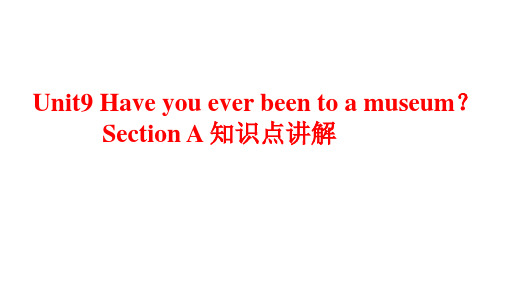
若前一句用分号,则so 不用大写第一个字母,而且so 前也无 须加and,同样构成并列句。
Jennifer likes to listen to music; so do I.
10.“so + 主语+动词”,这一结构用来表示对上文情况给 予进一步的肯定或确认。
---It was cold yesterday.昨天很冷。 ---So it was.确实是这样。
--- The students study hard.学生们学习很努力。 ---So they do.他们确实很努力。
--- He went to Shanghai yesterday.他昨天去北京了。 ---So he did.他确实去了。
1.— Have you ______ been to Xiamen? — No, ___A_____.
使用这一结构应注意以下几点: 一、注意结构中and 与标点符号的使用。 这一结构是一个完整的倒装句,因此,若前一句用句号,则so 应大写第一个字母。
Jennifer likes to listen to music. So do I.
若前一句用逗号,则so 前须加and,构成并列分句; Jennifer likes to listen to music, and so do I.
当前面的陈述句中有否定词few, little, never, no, nobody, hardly, seldom等词时,其后的简短疑问句应用肯定形式。 He can hardly swim, __ca_n__h_e_?
We have a little water, _d_o__w_e__?
以let’s开头的反义疑问句,简短疑问句部分用shall we;以let us 开头的反义疑问句,简短疑问部分用will you.
Jennifer likes to listen to music; so do I.
10.“so + 主语+动词”,这一结构用来表示对上文情况给 予进一步的肯定或确认。
---It was cold yesterday.昨天很冷。 ---So it was.确实是这样。
--- The students study hard.学生们学习很努力。 ---So they do.他们确实很努力。
--- He went to Shanghai yesterday.他昨天去北京了。 ---So he did.他确实去了。
1.— Have you ______ been to Xiamen? — No, ___A_____.
使用这一结构应注意以下几点: 一、注意结构中and 与标点符号的使用。 这一结构是一个完整的倒装句,因此,若前一句用句号,则so 应大写第一个字母。
Jennifer likes to listen to music. So do I.
若前一句用逗号,则so 前须加and,构成并列分句; Jennifer likes to listen to music, and so do I.
当前面的陈述句中有否定词few, little, never, no, nobody, hardly, seldom等词时,其后的简短疑问句应用肯定形式。 He can hardly swim, __ca_n__h_e_?
We have a little water, _d_o__w_e__?
以let’s开头的反义疑问句,简短疑问句部分用shall we;以let us 开头的反义疑问句,简短疑问部分用will you.
Unit9Haveyoueverbeentoamuseum_SectionA1a-2c课件人教版英语

Free talk Have you ever been to a/an_...? Yes, I have. /No, I haven’t.
have been to (去过),可 以与never[从没], ever [曾经], just[刚刚], once [一次], before[之前]连接。
ahsnmsciapsiawetutaruonscatrrecetmeymemrmzumeopusnuuoeastsuserepeumkuuammrmk
“我也是”结构: So+助动词/情态动词/be+主语(肯定) “So+助动词/be动词/情态动词+主语I.”=Me,too.
Drills --I have ever been to _a_s_c_i_en__ce__m__u_se_u_m___.
Have you ever been there?
回答1:Yes, __I_h_a_v_e___.
➢ 拓展:表示后者与前者情形相同,即“……也不……”时, 常用Me neither.或neither/nor引起的倒装句: Neither/Nor+助动词/系动词be/情态动词+主语.
时态上与前文保持一致,数要与其后的主语一致。
例:—I have never been to a water park.
Look at the map of the town. Listen and circle the places you hear.
2b Listen again and circle T for true or F for false.
Conversation 1
1. Tina went to the space museum last year. T/F
Unit9SectionB课件人教版英语八年级下册
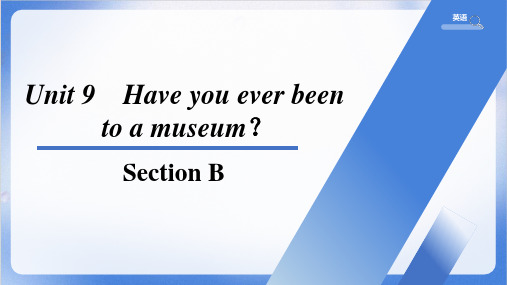
A.wake up me
B.wakes me up
C.wake me up
D.to wake up me
( D )5.Three fifths of the students in our school
boys.
A.be
B.am
C.is
D.are
-返回目录-
二、用所给单词的适当形式填空。
1.Linda has been (be) to the aquarium three times.
3.Can you find a lot of Chinese food there? 3.Yes,I / we can.
-返回目录-
4.What is the night zoo named? 4.The Night Safari.
5.How is the temperature in Singapore? 5.It is almost the same all year round.
她一方面教英语,另一方面学习汉语。
-返回目录-
(2)three quarters是分数3/4的英文表达法。分数是由基数词和序数词 一起构成的。基数词作分子,序数词作分母,分子大于1时,序数词 要用复数形式。如: 3/4: three fourths 或者three quarters 1/3: one third或者 a third 2/3: two thirds 注意:当分数引导短语作主语时,谓语动词用单数还是复数取决于of 后面的名词,即与分数所修饰的名词保持一致。
whether还可意为“是否”,常引导宾语从句,此时可与if互换。如: I don’t know if / whether he is satisfied with my work.我不知道他对我的工作 是否满意。
Unit9 Section A Gramm Focus课件2021-2022学年人教版英语八年级下册
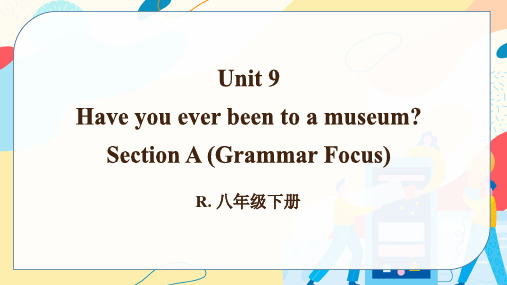
with Jane. A: How about your sister? B: She’s taking a shower right now because
she (2) _h_a_s__b_e_e_n_t_othe gym (健身房).
A: I (3)h_a_v_e__b_e_en__t_o the gym twice this week. It’s really tiring.
—Yes, I have been there once.
A. Have; gone B. Have; been
C. Do; go
D. Were; going
新疆乌鲁木齐中考
3.My friend’s new restaurant in Wanda Plaza (万达广 场) ______ two years ago, but I ______ there so far.
have been in+组织,表示加入某组织。 eg: He has been in the army for 3 years. 他参军三年了。
have been+adj./n.呈现……状态 eg: The shop has been open for 10 years. 这家店营业十年了。 We have been friends since we were 5. 我们从5岁起就一直是朋友。h
Language points
1. Well, I’ve already been there a couple of times, but I’m happy to go again.(教材P68 4a) a couple of 两个;一对;几个
a couple of 后跟可数名词复数。a couple of... 作主语时, 谓语动词用复数形式。 ➢ There are a couple of shoes in my bedroom, but they
she (2) _h_a_s__b_e_e_n_t_othe gym (健身房).
A: I (3)h_a_v_e__b_e_en__t_o the gym twice this week. It’s really tiring.
—Yes, I have been there once.
A. Have; gone B. Have; been
C. Do; go
D. Were; going
新疆乌鲁木齐中考
3.My friend’s new restaurant in Wanda Plaza (万达广 场) ______ two years ago, but I ______ there so far.
have been in+组织,表示加入某组织。 eg: He has been in the army for 3 years. 他参军三年了。
have been+adj./n.呈现……状态 eg: The shop has been open for 10 years. 这家店营业十年了。 We have been friends since we were 5. 我们从5岁起就一直是朋友。h
Language points
1. Well, I’ve already been there a couple of times, but I’m happy to go again.(教材P68 4a) a couple of 两个;一对;几个
a couple of 后跟可数名词复数。a couple of... 作主语时, 谓语动词用复数形式。 ➢ There are a couple of shoes in my bedroom, but they
外研版八年级英语下册课件:Module9 Friendship

My suggestion is: smile at the world and it will smile back.
➢ ~ sb./sth. ➢1 MPyutfa~thinermme,aIdweiltlhneo_stu_l_ge_tg_ye_so_tu_io_dntohwant .I should find a
A smile changed her life.
Careful reading
Read paragraph1-3 Nhomakorabeand answer questions.
1.At the age of thirteen, a girl gave me an important gift.(找出此 句的同义句)
2. We can infer from the post three paragraphs A. Zhang Bei had a good friend. B. The girl with a smile remembered why she smiled at Zhang Bei. C. Zhang Bei still feels lonely now.
the other后接可数名词复数,意为 “其余的……”。any other后接可数 名词单数为同义表达,意为“其他 任何一个……”。例如:
Jack studies harder than any other student in our school. =Jack studies harder than the other students in our school. 在我们学校杰克学习最努力。
Tips: focus on details(细节); learn to infer the words in the context(语篇)
➢ ~ sb./sth. ➢1 MPyutfa~thinermme,aIdweiltlhneo_stu_l_ge_tg_ye_so_tu_io_dntohwant .I should find a
A smile changed her life.
Careful reading
Read paragraph1-3 Nhomakorabeand answer questions.
1.At the age of thirteen, a girl gave me an important gift.(找出此 句的同义句)
2. We can infer from the post three paragraphs A. Zhang Bei had a good friend. B. The girl with a smile remembered why she smiled at Zhang Bei. C. Zhang Bei still feels lonely now.
the other后接可数名词复数,意为 “其余的……”。any other后接可数 名词单数为同义表达,意为“其他 任何一个……”。例如:
Jack studies harder than any other student in our school. =Jack studies harder than the other students in our school. 在我们学校杰克学习最努力。
Tips: focus on details(细节); learn to infer the words in the context(语篇)
人教版英语八年级下册Unit 9 - Section B教材全解知识点课件
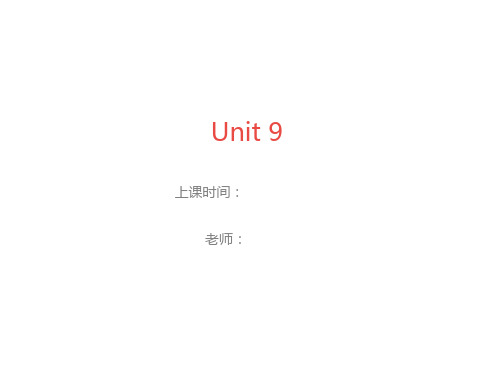
Unit 9
上课时间: 老师:
1b
• For thousands of tourists from China, this small island in Southeast Asia is a wonderful and safe place to take a holiday. (1)thousands of意为“数以千计的;许许多多的“ thousand数词,意为“一千”,当表示一个确切的数目时, thousand前面有具体数字,其后不加-s,不和of连用 若表示一个不确切的数目,thousand前面没有具体数字, 其后要加-,且与of连用。 Thousands of tourists come to visit the Great wall everyday. There are about six thousand students in our school.
2b
• For thousands of tourists from China, this small island in Southeast Asia is a wonderful and safe place to take a holiday. (1)thousands of意为“数以千计的;许许多多的“
a half 二分之一
one sixth六分之一
two thirds 三分之二
2b
• On the one hand, more than three quarters of the population are Chinese , so you can simply speak Putonghua a lot of the time. On the other hand, Singapore is an English-speaking country, so it's also a good place to practice your English ! (2)three quarters意为“四分之 三”,其中quarter用作可数名词,意 为“四分之……” [拓展]分数作主语时,谓语动词的单复数一般要与分数后面的名词 的数保持致。若名词为可数名词复数形式,谓语动词用复数形式; 若名词为可数名词单数形式或不可数名词,谓语动词用第三人称 单数形式。
上课时间: 老师:
1b
• For thousands of tourists from China, this small island in Southeast Asia is a wonderful and safe place to take a holiday. (1)thousands of意为“数以千计的;许许多多的“ thousand数词,意为“一千”,当表示一个确切的数目时, thousand前面有具体数字,其后不加-s,不和of连用 若表示一个不确切的数目,thousand前面没有具体数字, 其后要加-,且与of连用。 Thousands of tourists come to visit the Great wall everyday. There are about six thousand students in our school.
2b
• For thousands of tourists from China, this small island in Southeast Asia is a wonderful and safe place to take a holiday. (1)thousands of意为“数以千计的;许许多多的“
a half 二分之一
one sixth六分之一
two thirds 三分之二
2b
• On the one hand, more than three quarters of the population are Chinese , so you can simply speak Putonghua a lot of the time. On the other hand, Singapore is an English-speaking country, so it's also a good place to practice your English ! (2)three quarters意为“四分之 三”,其中quarter用作可数名词,意 为“四分之……” [拓展]分数作主语时,谓语动词的单复数一般要与分数后面的名词 的数保持致。若名词为可数名词复数形式,谓语动词用复数形式; 若名词为可数名词单数形式或不可数名词,谓语动词用第三人称 单数形式。
人教版八年级英语下 Unit 9 Section B (1a-2e) 课件

__✓__ Have you seen the Terracotta
Army?
1c
Listen again and take notes.
Name: ____________P_e_t_e_r______________ Country: _______A_u_s_t_r_a_l_i_a_____________ How long in China: ___t_w_o__w_e_e_k_s_________ Places visited:t_h_e_P_a_l_a_c_e__M_u_s_e_u_m_,________ he G_r_e_at__W_a_l_l_,__t_h_e_B_i_r_d_’_s__N_es_t_,__t_he__T_e_r_ra_c_o_t_ta_ Arm Food: _________B_e_i_j_i_n_g__D_u_c_k___________
To learn new words: thousand, safe, simply, fear, whether, Indian, Japanese, fox, whenever, spring, mostly…
温故知 新
Complete the sentences. 1. 她已经去火车站接她朋友了。
Shheas__g_on_e___ to the train station to
meet her friend. 2. 谢谢你所做的一切。 have done
Thanks for all that you ____
3. 我很久没有看到你了。
Iha_v_e_n_’__t_ ____ you for a long tsiemeen.
you'll find a lot of food from China; you wont have any problem getting rice, n精o彩o的dl,e优s秀o的r dumplings. Singapore is also an excellent place to try new food. Whether you like Indian foo也d许,你W会es担t心er人n在国外 food or Japanese food, you’找不ll到可fi以n吃d的i东t西。
Army?
1c
Listen again and take notes.
Name: ____________P_e_t_e_r______________ Country: _______A_u_s_t_r_a_l_i_a_____________ How long in China: ___t_w_o__w_e_e_k_s_________ Places visited:t_h_e_P_a_l_a_c_e__M_u_s_e_u_m_,________ he G_r_e_at__W_a_l_l_,__t_h_e_B_i_r_d_’_s__N_es_t_,__t_he__T_e_r_ra_c_o_t_ta_ Arm Food: _________B_e_i_j_i_n_g__D_u_c_k___________
To learn new words: thousand, safe, simply, fear, whether, Indian, Japanese, fox, whenever, spring, mostly…
温故知 新
Complete the sentences. 1. 她已经去火车站接她朋友了。
Shheas__g_on_e___ to the train station to
meet her friend. 2. 谢谢你所做的一切。 have done
Thanks for all that you ____
3. 我很久没有看到你了。
Iha_v_e_n_’__t_ ____ you for a long tsiemeen.
you'll find a lot of food from China; you wont have any problem getting rice, n精o彩o的dl,e优s秀o的r dumplings. Singapore is also an excellent place to try new food. Whether you like Indian foo也d许,你W会es担t心er人n在国外 food or Japanese food, you’找不ll到可fi以n吃d的i东t西。
英语八年级下册Unit9初二下9单元阅读课件作者:谢春梅

(Talk about Bazhong from many ways)
…. (Make a conclusion)
Write a passage to introduce your hometown, you can write it from many aspects.
(多方面)
Thank you!
Task: Read paragraph 1,try to find out the key words and find the main idea of this paragraph.
key words: _po_s_it_io_n _po_p_ul_at_io_n_ _la_n_gu_a_ge_ What does para.1 mainly tell us? A. It tells us Singapore is an island in Asia.
key words: _w_e_at_he_r___ What does para.4 mainly tell us?
A. You can visit Singapore only in the summer.
B. It’s not far from Singapore to China.
C. One great thing about Singapore is that the temperature is almost the same all year round.
location population
in northeast of Sichuan more than 3 million people
food
traditional food, such as hot-pot ...
…. (Make a conclusion)
Write a passage to introduce your hometown, you can write it from many aspects.
(多方面)
Thank you!
Task: Read paragraph 1,try to find out the key words and find the main idea of this paragraph.
key words: _po_s_it_io_n _po_p_ul_at_io_n_ _la_n_gu_a_ge_ What does para.1 mainly tell us? A. It tells us Singapore is an island in Asia.
key words: _w_e_at_he_r___ What does para.4 mainly tell us?
A. You can visit Singapore only in the summer.
B. It’s not far from Singapore to China.
C. One great thing about Singapore is that the temperature is almost the same all year round.
location population
in northeast of Sichuan more than 3 million people
food
traditional food, such as hot-pot ...
英语人教版八年级下册Unit9全单元精品PPT课件

(c)
A: Have you been to … B: Yes, I have./No, I haven’t.
(d)
A: Have you been to … B: Yes, I have./No, I haven’t.
speak English and Putonghua
at night /in any season
Have Have
单词拼写。 1. I have never seen such a big_am_u_s_em_e_nt (娱乐 )
park. 2. It’s_un_be_li_ev_ab_le_ (难以置信的)that it’s snowing in
March in South China.
They have come into the room.
already: “已经”通常用于肯定句中。 I have already posted the letter.
有时,也用在疑问句中表示惊讶。
Have you eaten up all the food already ?
Yet:
“仍然,还 ” 用在疑问句和否定句 中。
__f_o_r___a week ____fo_r__a long time ___s_in_c_e_1997
___fo_r__two weeks _s_in_c_e___three years
ago __s_in_c_e__ last month
比较现在完成时和过去时的区别: *现在完成时所表示的是过去的行动所早成 的现在的情况。 *一般过去时表示的是过去发生的事实。
现在完成时不能和确定的过去 时间状语连用,如:yesterday, last year, in 1976,two days ago, just now… 但可以和一些不确定的时间状语连用,也 可和包括现在在内的时间状语连用,如:
2014新人教版八年级英语下unit9单元课件

1b
Listening 1
Listen. Have these students ever been to
these places? Check (√) the boxes.
Science History Art Nature eum museum Claudia
4 I wonder how much more computers will be able to do in the future. 不知道将来电脑还能够做些什么事情呢。 wonder v.想要知道(how, what , who , if , whether) I wonder how they’re getting on.
1.When did Sarah visit the National Science Museum? A. Today B. Yesterday C. Last year 2. When did Claudia visit the nature museum? A. Last year B. Last summer C. Last school trip 3. What may the relationship be between the two speakers? A. Friends B. Teacher and student C. Mother and kid.
Have you ever been to Hainan Island? Yes, I have./No, I haven‟t./No, never.
zoo
Have you ever been to …? Yes, I have. / No, I haven‟t. /No, never.
space museum Have you ever been to …? Yes, I have. / No, I haven‟t. /No, never.
Unit9 Section A (Grammar Focus -4c)课件 人教版八年级下册英语

adj. 德国的;德语的;德国人的 n. 德语;德国人
There are some special German paintings there right now.
B: Sure. When do you want __t_o_g_o__ (go) ?
5. A: Have you ever __v_i_si_t_e_d__ (visit) the history museum?
the space museum?
No, I haven’t.
I’ve been to the art Me, too. And I’ve also visited the
museum many times.
nature museum.
I’ve never been to a water park.
Me neither.
现在完成时(Ⅱ) 现在完成时表示经历的用法
现在完成时常用have been to (去过), ever (曾经),never (从没)等表示经历。
现在完成时(二)
一、现在完成时中的 ever 和 never ① ever 的含义及用法
ever 作副词,意为“曾经”,常用于现在完成时的否定句和 疑问句中,位于助动词 have/has 之后、过去分词之前。 ➢Have you ever seen anything like it? 你曾见过像它这样的东西吗? ➢I don't think I have ever been here before. 我觉得我以前从未到过这里。
2.许多次______m__a_n_y__t_im__e_s________________
3.自然博物馆___n__a_t_u_r_e_m__u_s_e_u_m_______________ 4.在科技馆_____a_t__th__e_s_c_i_e_n_c_e_m__u_s_e_u_m______ 5.上个周末_____la_s_t_w__e_e_k_e_n_d__________________ 6.在动物园____a_t_t_h_e__z_o_o__________________ 7.令人兴奋的供乘骑的游乐设施__m__a_n_y__e_x_c_it_i_n_g__ri_d_e_s_ 8.立刻;马上_______r_i_g_h_t__n_o_w_/_a_t_o__n_c_e_____ 9.我也没有___m__e__n_e_i_th_e_r_____________________ 10.一个特别的主题_a__s_p_e_c_i_a_l_t_h_e_m__e________ 11.听说__h_e_a__r_o_f____________________________
There are some special German paintings there right now.
B: Sure. When do you want __t_o_g_o__ (go) ?
5. A: Have you ever __v_i_si_t_e_d__ (visit) the history museum?
the space museum?
No, I haven’t.
I’ve been to the art Me, too. And I’ve also visited the
museum many times.
nature museum.
I’ve never been to a water park.
Me neither.
现在完成时(Ⅱ) 现在完成时表示经历的用法
现在完成时常用have been to (去过), ever (曾经),never (从没)等表示经历。
现在完成时(二)
一、现在完成时中的 ever 和 never ① ever 的含义及用法
ever 作副词,意为“曾经”,常用于现在完成时的否定句和 疑问句中,位于助动词 have/has 之后、过去分词之前。 ➢Have you ever seen anything like it? 你曾见过像它这样的东西吗? ➢I don't think I have ever been here before. 我觉得我以前从未到过这里。
2.许多次______m__a_n_y__t_im__e_s________________
3.自然博物馆___n__a_t_u_r_e_m__u_s_e_u_m_______________ 4.在科技馆_____a_t__th__e_s_c_i_e_n_c_e_m__u_s_e_u_m______ 5.上个周末_____la_s_t_w__e_e_k_e_n_d__________________ 6.在动物园____a_t_t_h_e__z_o_o__________________ 7.令人兴奋的供乘骑的游乐设施__m__a_n_y__e_x_c_it_i_n_g__ri_d_e_s_ 8.立刻;马上_______r_i_g_h_t__n_o_w_/_a_t_o__n_c_e_____ 9.我也没有___m__e__n_e_i_th_e_r_____________________ 10.一个特别的主题_a__s_p_e_c_i_a_l_t_h_e_m__e________ 11.听说__h_e_a__r_o_f____________________________
新目标英语八年级下册_unit9_单元课件 (1)
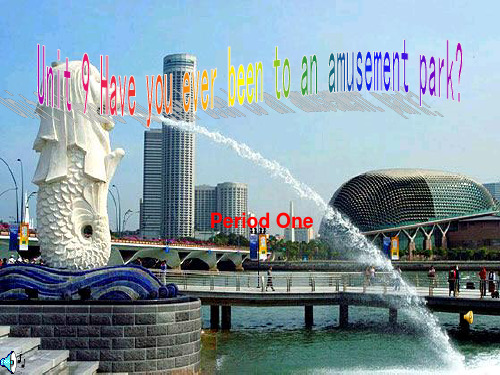
Period Three
magician(魔术师)
I have ever been to visit many cities in China. My favorite city is Hong Kong.
There are so many fun places in Hong Kong!
Disneyland
( B ) 4. Kate’s never seen Chinese movies, _____? A. hasn’t she B. has she C. isn’t she
D. is she
( C ) 5. “Mum, may I go out and play basketball?” “_____ you _____your homework yet?” A. Do, finish B. Are, finishing C. Have, finished
想象汉语当中如何表达过去的时间当中 已经开始做并且现在仍在进行的动作?
我早就开始学习英语了。
妈妈还在忙着打扫卫生。
我打羽毛球已经两年了。 我以前从来没有去过北京。
英语当中表达已经发生并且还在进行的动作的方式
1.Have you ever been to 你曾经去过海洋馆么? the aquarium?
Neither
①
②
③
adj./pron./adv. adv. 也不 1). Me neither. 2). neither + be/助动词 + 主语 e.g. 他不是医生,我也不是。 He isn’t a doctor. Neither am I. 我不喜欢苹果,她也不。 I don’t like apples. Neither does she. 我还没有完成作业,他也没有。 I haven’t finished my work. Neither has she pron. 两者都不 Neither of us likes apples. adj. 两者都不 Neither his parents likes apples.
八年级下册英语__Unit9_复习课件

are 8. More than three quarters of the population _____(be) Chinese.
equirement 9 As a student, I find that the most important r______ is to learn
English well.
Exercises
1. 超过四分之三的新加坡人口是中国人. three quarters population More than _____ _______ of the ________ in Singapore _____ Chinese. are 2. 你可以看见迪斯尼的角色一直围绕着迪斯尼乐园转. You can _____Disney characters _______ around see walking ______ Disneyland ______ _____ time all the ______. 3. 在迪斯尼乐园是如此的有趣. so It is _____much fun ______ ______ in Disneyland. 4. 船运行不同的路线,但在同一地方结束. The boats take ______different routes _______ _______,but they all ______ _____ in the same place. end up 5. 我曾经想做的一切就是旅行. ___ __ever wanted to do All I ____ _____ __ __ was travel.
结束性动词不能和表示一段时间的时间状语连用,但是他可以转 换成相应的延续性动词.
1.直接用延续性动词
buy– have
八年级英语下册Unit9Have you ever been to a museum 教学课件_

A. study B. studies C. to study D. studying 2. 他的话鼓舞了我。
His words _e_n_c_o_u_r_a_g_e_d_ _m__e_.
5. Have you tried Chinese food? 你品尝过中国食品吗?
try vt.品尝;尝。后接名词作宾语。
◎Practice 1. 这项工作进展迅速。
The work is _p_r_o_g_re_s_s_in__g rapidly. 2. 最近我英语进步很大。
I have _m_a_d__e __g_r_e_a_t_ __p_r_o_g_r_e_s_s__ in English recently.
4. It also encourages governments and social
◎Contrast: both/either/neither a. both意为“两者都”,一般用于肯定的陈述句。 与of连用作主语时,其后谓语动词用复数形式; 作定语时,其后常跟名词的复数形式。 b. either意为“两者之一;两者中任一个”。用 作主语时,其后谓语动词用单数形式;用作定 语时,只修饰可数名词的单数形式。还可以用 于否定句中表示“也”,这种用法与肯定句中 的too相对应。
(3)seem to do sth.
(4)It seems that来自clause①They seem (to be) the criminals wanted. 他们好像是被通缉的犯罪分子。
②It seems like years since I last meet you. 自从上次与你邂逅, 似乎已时隔多年。
of my little brother. 自打我小弟弟出生,我们就一直这样生活。
His words _e_n_c_o_u_r_a_g_e_d_ _m__e_.
5. Have you tried Chinese food? 你品尝过中国食品吗?
try vt.品尝;尝。后接名词作宾语。
◎Practice 1. 这项工作进展迅速。
The work is _p_r_o_g_re_s_s_in__g rapidly. 2. 最近我英语进步很大。
I have _m_a_d__e __g_r_e_a_t_ __p_r_o_g_r_e_s_s__ in English recently.
4. It also encourages governments and social
◎Contrast: both/either/neither a. both意为“两者都”,一般用于肯定的陈述句。 与of连用作主语时,其后谓语动词用复数形式; 作定语时,其后常跟名词的复数形式。 b. either意为“两者之一;两者中任一个”。用 作主语时,其后谓语动词用单数形式;用作定 语时,只修饰可数名词的单数形式。还可以用 于否定句中表示“也”,这种用法与肯定句中 的too相对应。
(3)seem to do sth.
(4)It seems that来自clause①They seem (to be) the criminals wanted. 他们好像是被通缉的犯罪分子。
②It seems like years since I last meet you. 自从上次与你邂逅, 似乎已时隔多年。
of my little brother. 自打我小弟弟出生,我们就一直这样生活。
人教版初二八年级英语下册 Unit 9 Have you been to an amusement park PPT课件

现在完成时与一般过去时的区别:
• 现在完成时:表示过去发生或已经完成的某一动 作对现在造成的影响或结果,或从过去开始一直延 have / has + V过去分词 续到现在的动作或保存的状态,强调的是现在的情 况,不能和表示过去的时间状语连用(如:in 1990, last Sunday 等)。 • 一般过去时:一般过去时只表示过去的动作或状 态,和现在不发生关系(即动作或状态在现在已经 结束),它可以和表示过去的时间状语连用。
T
T T
Listen again and circle T or F.
Conversation 2
Linda has been to the aquarium.
Linda went to the zoo three times last year. Linda is going to the zoo again next week.
F
T F
Listen again and circle T or F. Conversation 3
Harvey had a great time at Water World.
Harvey’s friend has never been to Water World. Harvey and his friend are going skatinse students ever been to these places?
Amusement park Water park Space museum
Aquarium
Zoo
Claudia
√
Sarah
√
√ √
√ √
Look at the map of the town. Listen and circle the places you hear.
人教版英语八年级下册Unit9Have you ever been to a museum SectionB复习课件(共张31)
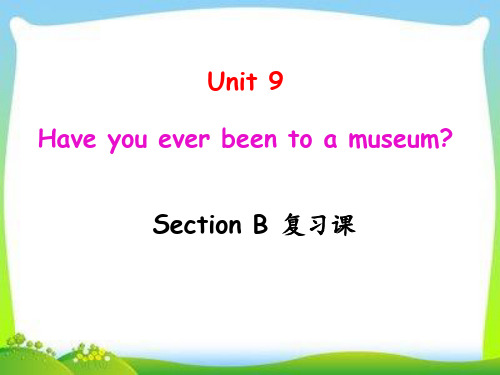
I wonder whether he will come back or not.
要点2
Indian 此处用作形容词,意为“印度的”。 Indian 还可用作名词,意为“印度人” India 用作名词,意为“印度”
归纳: 英语中,一些表示国家或地区的名词, 可加后缀-(a)n构成形容词,意为“......(人)的”
They have some pro.5b. lems _l_e_ar_n_i_n_g_ languages.
句型透析
1. Have you tried Chinese food? try sth. 尝试某事物
try小结
try one's best to do sth. 尝试某事物
try to do sth. 尽力做某事 try doing sth. 尝试做某事
3.我想去一个讲英语的国家度假。
I want to go on vacation in an __E_n_g_l_is_h_-_s_p_e_ak_in_g__c_o_u_n_tr.y
4.我们学校一年四季看起来都很漂亮。
Our garden looks beautiful __a_ll _y_e_ar_r_o_u_n_d_..
4. Maybe you fear that you won’t be able to find anything good to eat when you travel.
要点 fear 此处用作动词,意为“害怕,惧怕”, 后常接名词、动词不定时、V-ing 形式或 that 从句。
e.g. The little girl fears ___to__te_l_l her mother the truth. He fears _w__a_tc_h_i_n_g(watch) the thrillers.
要点2
Indian 此处用作形容词,意为“印度的”。 Indian 还可用作名词,意为“印度人” India 用作名词,意为“印度”
归纳: 英语中,一些表示国家或地区的名词, 可加后缀-(a)n构成形容词,意为“......(人)的”
They have some pro.5b. lems _l_e_ar_n_i_n_g_ languages.
句型透析
1. Have you tried Chinese food? try sth. 尝试某事物
try小结
try one's best to do sth. 尝试某事物
try to do sth. 尽力做某事 try doing sth. 尝试做某事
3.我想去一个讲英语的国家度假。
I want to go on vacation in an __E_n_g_l_is_h_-_s_p_e_ak_in_g__c_o_u_n_tr.y
4.我们学校一年四季看起来都很漂亮。
Our garden looks beautiful __a_ll _y_e_ar_r_o_u_n_d_..
4. Maybe you fear that you won’t be able to find anything good to eat when you travel.
要点 fear 此处用作动词,意为“害怕,惧怕”, 后常接名词、动词不定时、V-ing 形式或 that 从句。
e.g. The little girl fears ___to__te_l_l her mother the truth. He fears _w__a_tc_h_i_n_g(watch) the thrillers.
- 1、下载文档前请自行甄别文档内容的完整性,平台不提供额外的编辑、内容补充、找答案等附加服务。
- 2、"仅部分预览"的文档,不可在线预览部分如存在完整性等问题,可反馈申请退款(可完整预览的文档不适用该条件!)。
- 3、如文档侵犯您的权益,请联系客服反馈,我们会尽快为您处理(人工客服工作时间:9:00-18:30)。
I have ever been to …but I have never been to.... I want to go to…because …
Exercise 1.Our classroom __i_s____c_l_e_a_n_e_d______
﹙clean﹚three times every day .
情感目标:Lead students to know
how to share their happiness with others and find out some good things.
the Great Wall
你曾经去过…吗?
Have you ever been to the Great Wall? Yes, I have. / No, I haven’t.
T
Listening task: True or False
Conversation 2
Linda has been to the aquarium.
F
Linda went to the zoo three times last year. T
Linda is going to the zoo again next week. F
holiday? B: I’m going to … A: How are you going to get there? B: I’m going to get there by…
the Palace Museum
Guilin
Shanghai
Hainan
Write a short passage about your traveling plan.
Unit 9 Have you ever been to an amusement park?
Gucheng Middle School Zheng Jinyan
知识目标:
Let students learn about these key
sentences: Have you ever been to…?
此课件下载可自行编辑修改,仅供参考! 感谢您的支持,我们努力做得更好!谢谢
A: Have you ever been to…? B: Yes, I have. / No, I haven’t. A: When did you go there? B: I went there …? A: How did you go there? B: I went there by … A: Where are you going this Summer
Wuwei
你曾经去过…吗?
Have you ever been to Wuwei? Yes, I have. / No, I haven’t.
•No, I haven’t. I have never been anywhere. • Yes, I have. I have been to...
2a Listening
教
/ I’ve never been to….
能力目标:
学 目
1.Enable the students to talk about
where they have been to using
标 Present Perfect tense.
2.To practice listening skills.
Listening task: True or False
Conversation 3
Harvey had a great time at Water World. F Harvey’s friend has never been to Water T
World.
Harvey and his friend are going skating. T
2. The flowers in the garden_a_r_e_w__a_t_e_re__d___ water﹚once two weeks.
3.My hair _is_n__’t_w__a_s_h_e_d ﹙not wash﹚ every day.
4.English __is__sp__o_k_e_n_﹙speak﹚ widely in the world ?
Listening task: True or False
Conversat space museum last year. T
John has never been to the space museum. T
They are going to take the subway.
Exercise 1.Our classroom __i_s____c_l_e_a_n_e_d______
﹙clean﹚three times every day .
情感目标:Lead students to know
how to share their happiness with others and find out some good things.
the Great Wall
你曾经去过…吗?
Have you ever been to the Great Wall? Yes, I have. / No, I haven’t.
T
Listening task: True or False
Conversation 2
Linda has been to the aquarium.
F
Linda went to the zoo three times last year. T
Linda is going to the zoo again next week. F
holiday? B: I’m going to … A: How are you going to get there? B: I’m going to get there by…
the Palace Museum
Guilin
Shanghai
Hainan
Write a short passage about your traveling plan.
Unit 9 Have you ever been to an amusement park?
Gucheng Middle School Zheng Jinyan
知识目标:
Let students learn about these key
sentences: Have you ever been to…?
此课件下载可自行编辑修改,仅供参考! 感谢您的支持,我们努力做得更好!谢谢
A: Have you ever been to…? B: Yes, I have. / No, I haven’t. A: When did you go there? B: I went there …? A: How did you go there? B: I went there by … A: Where are you going this Summer
Wuwei
你曾经去过…吗?
Have you ever been to Wuwei? Yes, I have. / No, I haven’t.
•No, I haven’t. I have never been anywhere. • Yes, I have. I have been to...
2a Listening
教
/ I’ve never been to….
能力目标:
学 目
1.Enable the students to talk about
where they have been to using
标 Present Perfect tense.
2.To practice listening skills.
Listening task: True or False
Conversation 3
Harvey had a great time at Water World. F Harvey’s friend has never been to Water T
World.
Harvey and his friend are going skating. T
2. The flowers in the garden_a_r_e_w__a_t_e_re__d___ water﹚once two weeks.
3.My hair _is_n__’t_w__a_s_h_e_d ﹙not wash﹚ every day.
4.English __is__sp__o_k_e_n_﹙speak﹚ widely in the world ?
Listening task: True or False
Conversat space museum last year. T
John has never been to the space museum. T
They are going to take the subway.
